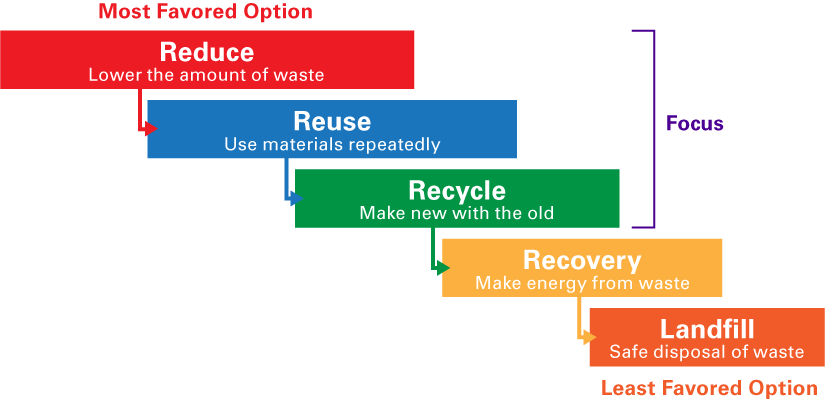Waste Minimization and Diversion
Our approach to waste management on campus is the continuous promotion of the three R's: Reduce, Reuse and Recycle (Compost) which is very vital in achieving an effective waste minimization and diversion program. We are committed to the establishment of a sustainable campus through promotion of the reduction of waste produced, reusing materials as much as possible and as well recycling and compost materials into new products.

Reduce Waste Generation
Waste reduction/minimization can only be possible when waste generators do not produce the waste in the first place or possibly reduce it as much as possible. This is the foundation of any waste management program. Once a waste is identified, throwing it in the trash should not be the first thing but rather ask if it may be reused or recycled. We strongly encourage all Iowa State Faculty, staff and students to only buy what they need as well as always look for ways to reduce consumption, thereby lowering their carbon footprint.
Reuse
The campus offers several reuse opportunities to students, faculty and staff for items they would otherwise consider waste and send to the landfill.
Through Iowa State University's Surplus Program, a variety of supplies related to campus offices and operations (furniture, equipment etc.) that are deemed unwanted by one department and/or unit can be and have been utilized by another department and/or unit rather than thrown away. This program initiative has saved more than $250,000 of reusable assets into university operations on an annual basis. In addition to being utilized for campus operations, surplus items are also offered for sale to university employees and students, as well as community members and businesses during weekly public sales.
Another reuse program opportunity is the Move Out Donation Program managed by the Department of Residence which is an annual spring move-out collection event in which any reusable item (clothes, furniture, electronics, food, cleaning supplies, etc.) is collected for redistribution to community shelters, food banks and non-profit organizations. Other initiatives under the reuse program such as t-shirt collection, community clothing, book and FreeCycle swaps, textbook collection and Iowa State Dining's donation of "day-old" items from five of its campus cafes to community programs and organizations improves our campus waste diversion goals.
Recycle/Compost
Recycle
The single stream recycling program allows all recyclables to be placed in the bins for recycling rather than sorting them individually. These collected materials from campus are taken to a Materials Recovery Facility (MRF) in Des Moines where they are sorted and sold to markets as raw materials to produce new products. This is designed to increase the ease and convenience of recycling, encourage more participation, and save resources by reducing waste. Campus-wide single stream recycling is offered to all students, faculty, and staff in academic and campus residential buildings. Learn more on what can be recycled on campus.
Compost
The University Compost Facility which was built in 2008 compost food waste on campus mostly from ISU Dining's catering services and residential dining facilities. Food waste can also be composted in Frederikson Court.
As part of the ISU Research and Demonstration Farms, the University Compost Facility produces an annual report on its progress and accomplishments. Although only those affiliated with ISU can bring materials into or out of the site, tours are available to the general public. Please send questions or comments to site manager Steve Jonas.
Waste Minimization and Diversion Plan
The recently approved University 2021-2025 Strategic Plan for Sustainability in Operations guides focused commitment to reducing carbon emissions, reducing energy consumption, applying cohesive and overarching sustainability procedures to day-to-day operations including waste, water and grounds management. The waste section of the "Strategic Plan for Sustainability in Operations" upon which this waste minimization and diversion plan is anchored focuses on advancing waste prevention and divert non-hazardous construction and demolition debris and non-hazardous solid waste debris, including food and compostable material, and to pursue opportunities toward a 10% waste reduction and 85% waste diversion by year 2025. That is, waste generation is reduced by 10% and 85% of campus waste is diverted and does not enter a landfill with the following targeted goals: "Reduce Waste Generation" and "Increase Waste Diversion". The emphasis of the zero-waste goal is about eliminating rather than managing waste, reducing consumption, minimizing waste from source and, maximizing recycling.
Zero Waste Team
To successfully engage the university community on the waste minimization and diversion, a team dedicated to that needs to be in place. The zero-waste team is a volunteer-based group that comprises of faculty, staff and students who are passionate about the university's zero waste efforts, recycling and sustainability efforts in general. The team serve as advocates for the waste minimization and diversion program across campus to engage peers and colleagues in their respective departments and buildings. In the future, they will also help volunteer during athletic events to educate fans.
The team plays a key role in supporting the university's 10% waste reduction and 85% waste diversion by year 2025. The team position is strategic to bring awareness to reduction of waste generation, encouraging reuse of materials as much as possible and ensure that materials that should be recycled does not end up in the landfill. Sign up to be part of the Zero Waste Team here.
Zero Waste Event Toolkit
The key to a great zero waste event is thoughtful planning! Follow these steps to help navigate achieving zero waste at your next event.